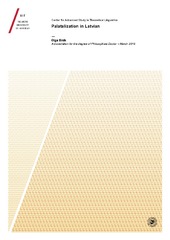Blar i forfatter Fakultet for humaniora, samfunnsvitenskap og lærerutdanning "Urek, Olga"
-
Bilinguals’ sensitivity to grammatical gender cues in Russian: the role of cumulative input, proficiency, and dominance
Mitrofanova, Natalia; Rodina, Yulia; Urek, Olga; Westergaard, Marit (Journal article; Tidsskriftartikkel; Peer reviewed, 2018-10-11)This paper reports on an experimental study investigating the acquisition of grammatical gender in Russian by heritage speakers living in Norway. The participants are 54 Norwegian-Russian bilingual children (4;0-10;2) as well as 107 Russian monolingual controls (3;0-7;0). Previous research has shown that grammatical gender is problematic for bilingual speakers, especially in cases where gender ... -
En splyv eller et splyv? Tilordning av grammatisk genus til nonord-substantiv i norsk
Urek, Olga; Lohndal, Terje; Westergaard, Marit (Journal article; Tidsskriftartikkel; Peer reviewed, 2022-05-12)Tradisjonelt har det norske genussystemet blitt karakterisert som lite transparent. Et viktig spørsmål er om språkbrukere likevel kan være sensitive til visse egenskaper ved substantiver og bruker disse produktivt når de tildeler genus til ukjente ord. I denne artikkelen undersøker vi eksperimentelt språkbrukeres sensitivitet til fonologiske egenskaper som vi har identifisert gjennom korpusundersøkelser. ... -
En splyv eller et splyv? Tilordning av grammatisk genus til pseudosubstantiv i norsk
Urek, Olga; Lohndal, Terje; Westergaard, Marit (Journal article; Tidsskriftartikkel; Peer reviewed, 2022-05-12)Tradisjonelt har det norske genussystemet blitt karakterisert som lite transparent. Et viktig spørsmål er om språkbrukere likevel kan være sensitive til visse egenskaper ved substantiver og bruker disse produktivt når de tildeler genus til ukjente ord. I denne artikkelen undersøker vi eksperimentelt språkbrukeres sensitivitet til fonologiske egenskaper som vi har identifisert gjennom korpusundersøkelser. ... -
Foreign Accent in Pre- and Primary School Heritage Bilinguals
Kupisch, Tanja; Kolb, Nadine; Rodina, Yulia; Urek, Olga (Journal article; Tidsskriftartikkel; Peer reviewed, 2021-05-24)Previous research has shown that the two languages of early bilingual children can influence each other, depending on the linguistic property, while adult bilinguals predominantly show influence from the majority language to the minority (heritage) language. While this observed shift in influence patterns is probably related to a shift in dominance between early childhood and adulthood, there is ... -
Internal and External Factors in Heritage Language Acquisition: Evidence from Heritage Russian in Israel, Germany, Norway, Latvia and the UK
Rodina, Yulia; Kupisch, Tanja; Meir, Natalia; Mitrofanova, Natalia; Urek, Olga; Westergaard, Marit (Journal article; Tidsskriftartikkel; Peer reviewed, 2020-03-11)In this paper, we consider elicited production data (real and nonce words tasks) from five different studies on the acquisition of grammatical gender in Heritage Russian, comparing children growing up in Germany, Israel, Norway, Latvia, and the United Kingdom. The children grow up in diverse heritage language backgrounds, ranging from small groups (in Norway) to large communities (in Latvia). ... -
Latvian CDI: Methodology, developmental trends and cross-linguistic comparison
Urek, Olga; Vulane, Anna; Dargis, Roberts; Taurina, Agrita; Zirina, Tija; Simonsen, Hanne Gram (Journal article; Tidsskriftartikkel; Peer reviewed, 2019-03-21)In this article, we report the results of a large-scale population study based on the Latvian adaptation of Communicative Development Inventories (CDI) – a parental report tool aimed at mapping the lexical and grammatical development of children under the age of three. Two CDI forms are discussed: CDI I: ‘Words and Gestures’ (8–16 months), and CDI II: ‘Words and Sentences’ (17–36 months). This article ... -
Overapplication opacity in phonological acquisition
Urek, Olga (Journal article; Tidsskriftartikkel; Peer reviewed, 2013)Phonological opacity is a challenge for parallel OT, which does not allow for intermediate levels of representation. Several modifications of the theory have been proposed over the years to incorporate opacity, all of them falling short of accounting for spontaneous opacity effects in developing grammars. In this paper I demonstrate that if certain independently motivated adjustments are made to ... -
Palatalization in Latvian
Urek, Olga (Doctoral thesis; Doktorgradsavhandling, 2016-05-23)Palatalization is very commonly attested across languages and has sparked considerable interest in fields like linguistic typology, phonetics, and phonology. However, palatalization notoriously exhibits a large degree of diversity, both cross-linguistically and within individual languages, which, on the one hand, precludes a straightforward phonetic explanation, and, on the other hand, poses ... -
Perspectives on Palatalization
Krämer, Martin; Urek, Olga (Journal article; Tidsskriftartikkel; Peer reviewed, 2016-08-31)In this article we provide a discussion of the definition of palatalization as a phonological phenomenon, its crosslinguistic variation, phonetic or functional grounding and phonetic (un)naturalness of palatalization, and theoretical approaches to palatalization patterns. After providing this background to the collection of articles in this special issue of Glossa we will give an overview of the ... -
Sensitivity to microvariation in bilingual acquisition: Morphophonological gender cues in Russian heritage language
Mitrofanova, Natalia; Urek, Olga; Rodina, Yulia; Westergaard, Marit (Journal article; Tidsskriftartikkel; Peer reviewed, 2021-09-27)Previous research on the acquisition of grammatical gender has shown that this property is acquired early in transparent gender systems such as Russian. However, it is not clear to what extent children are sensitive to the assignment cues and to what extent they simply memorize correspondences between frequent lexical items. Furthermore, we do not know if bilingual children are different from ...


 English
English norsk
norsk








